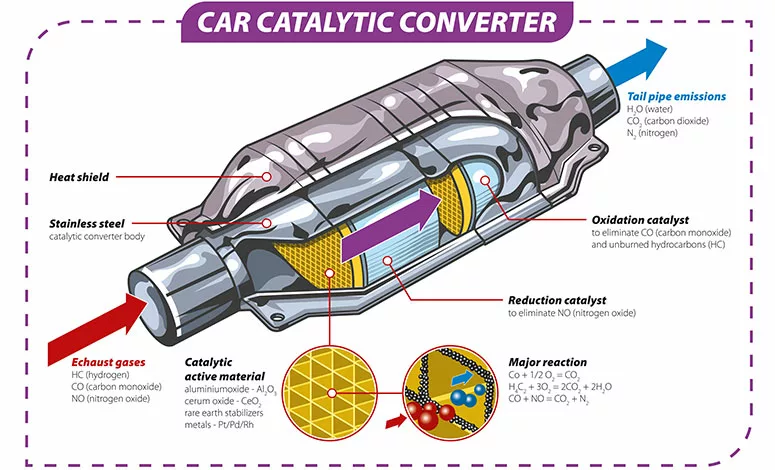In the realm of modern diesel engines, the diesel particulate filter (DPF) stands as a crucial component, acting as a guardian against harmful emissions. However, like any essential part, a DPF can become clogged over time, leading to a cascade of issues that impact both your vehicle’s performance and the environment. In this post, we will explore the symptoms of a clogged DPF and shed light on the associated replacement costs.
Understanding the Diesel Particulate Filter
The diesel particulate filter is a remarkable innovation designed to capture and store the soot and particulate matter emitted during the diesel combustion process. By trapping these particles, DPFs significantly reduce harmful emissions, playing a crucial role in maintaining air quality standards and protecting our environment.
Symptoms of a Clogged Diesel Particulate Filter
A clogged diesel particulate filter can lead to a cascade of problems, affecting both vehicle performance and emissions. Here are some telltale signs that your DPF might be clogged:
- Reduced Engine Performance: One of the earliest indicators of a clogged DPF is a noticeable reduction in engine power and acceleration. As the filter becomes obstructed, exhaust gases struggle to flow freely, resulting in sluggish performance.
- Increased Exhaust Smoke: A clogged DPF can lead to an increase in exhaust smoke, particularly during acceleration. This is due to the accumulation of unburned particles that are unable to pass through the obstructed filter.
- Dashboard Warning Lights: Modern vehicles are equipped with onboard diagnostics systems that monitor various components, including the DPF. If a blockage is detected, a dashboard warning light, often shaped like an engine or exhaust system, will illuminate.
- Regeneration Attempts: DPFs have a self-cleaning process called regeneration, where high exhaust temperatures burn off accumulated particles. If you notice frequent or unsuccessful regeneration attempts, it could signal a clogged DPF.
- Unusual Noises: A clogged DPF can create excessive back pressure in the exhaust system, leading to unusual noises such as rattling or hissing. These sounds are often more pronounced during acceleration.
- Poor Fuel Efficiency: A clogged DPF can compromise fuel efficiency as the engine works harder to overcome the exhaust restriction. This leads to increased fuel consumption and decreased mileage.
Replacement Cost of a Clogged Diesel Particulate Filter
Addressing a clogged DPF promptly is essential to prevent further damage to your vehicle and its emission control system. Depending on the severity of the clog and the extent of damage, you might need to consider either cleaning or replacing the DPF. Here’s a breakdown of the potential costs:
- DPF Cleaning Services: Professional DPF cleaning services are designed to remove accumulated soot and particulate matter from the filter, restoring its efficiency. The cost of DPF cleaning services can vary based on factors such as your location, the service provider, and the complexity of the cleaning process. On average, you can expect to pay anywhere from $100 to $400 for DPF cleaning services.
- DPF Replacement: In cases where the DPF is severely clogged or damaged, replacement might be necessary. The cost of a new DPF can vary widely depending on your vehicle’s make and model. On average, DPF replacement costs can range from $1,000 to $3,000, including parts and labor.
Prevention and Maintenance
Preventing a clogged DPF is not only cost-effective but also environmentally responsible. Regular maintenance and adherence to recommended driving patterns can significantly reduce the likelihood of DPF issues. Here are some preventive measures:
- Follow Manufacturer Guidelines: Adhere to your vehicle manufacturer’s recommendations for oil changes, fuel quality, and maintenance schedules. This can help maintain optimal engine performance and minimize DPF-related problems.
- Highway Driving: Regularly engaging in highway driving allows the exhaust system to reach higher temperatures, facilitating effective DPF regeneration.
- Use Quality Fuel: Opt for high-quality diesel fuel with low sulfur content. Clean fuel leads to cleaner combustion and fewer particulate emissions.
- Regular Inspections: Include DPF checks in your routine vehicle inspections. Early detection of issues can prevent costly repairs down the line.
A clogged diesel particulate filter can cast a shadow over your vehicle’s performance and contribute to harmful emissions. Recognizing the symptoms of a clogged DPF and addressing them promptly through either DPF cleaning services or replacement is vital for maintaining both your vehicle’s health and our environment’s well-being. Regular maintenance, proper driving habits, and seeking professional assistance when needed will ensure that your DPF continues to play its crucial role in keeping the air clean and your engine running efficiently.

